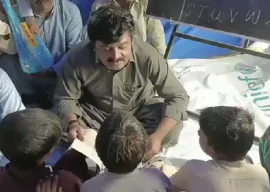1726645904-0/Express-Tribune-Web-(3)1726645904-0.png)
Nestled amongst the fresh monsoon fed verdure of mofussil surroundings of Jallo Park in Lahore exists a secluded farm house that is rendering a yeoman’s service to the cause of education for “Out of School” children through an unconventional approach.
A dedicated couple have earmarked a significant portion of their farmhouse for a school built and run through their own sources and some voluntary help from friends.
The school began as an idea in the mind Ms Shaiza Shahzad the wife of Major General Shazad Sikander (retired) who had spent a lifetime in the teaching profession treating her avocation as a passion while planning a teaching regimen of her school going daughter.
A building that was initially earmarked as a buffalo shed was converted into the first classroom in 2019, ministering to the needs of Out of School population of the local village. The school was opened to the poor and needy of the adjoining Mandianwala village where the aspiring children made a bee line for the school. There were a lot of “Out of School” children in surrounding villages like Dogarkot, Nathokai and Jallo who used to run errands for their elders besides whiling away their time in idle pursuits. Several amongst them would have either ended in a factory or a brick kiln nearby with a few landing in Madrassas that offer limited choices in life to their students. The couple adopted the initial batch of students with an alacrity and passion that impressed the parents who were chary and suspicious of the value of education as a life altering experience.
Initially the school was run by the couple themselves meeting all the expenses through own sources. When the need for teaching faculty was felt for the expanding intake, another novel approach was employed by training few promising students of the local village as teachers.
The teaching environment and methodology alongwith the books and stationery were kept in sync with the modern practices. The spartan furniture and frugal teaching accoutrements are a stark contrast to the quality of teaching and curriculum content.
The teaching passion was such that the couple led from the front taking teaching classes regularly. What started as a munificent noblesse oblige mission soon morphed into a well-structured school expanding from primary to matriculation level.
The basic impulse that animated this experiment was the desire to empower the local community at village level through education.
The challenge was to discover good quality teachers at village level which were in short supply. The issue was resolved by through teacher training program run by Ms Shaiza Sikander through her personal pedagogical engagement with few promising male and female individuals.
The aspiring teachers were trained in the teaching techniques by concentrating on few subjects and associated books imparting focused skills. By this subject specific teaching approach, a small pool of teachers was created who despite their limited exposure attained expertise in few subjects better than several teachers with better exposure and qualifications.
Another great advantage of this experiment was the better bonding of local teachers with the local kids.
Since this school concentrated on Out of School children with many amongst them the first in their families to have joined a school, and who had overshot the age limit for kindergarten classes, a novel teaching regimen was introduced.
This regimen followed accelerated learning methodology with class 1 to 8th covered in three years. The response and the results of this experience are amazing with several children having gone through the regimen with success.
The accelerated learning regimen was attractive for girls too who were either drop outs or whose families had denied them the educational opportunities.
Another important feature of this educational project is the empowerment of girls through education. The girls from impoverished and deprived backgrounds who used to be denied basic opportunities available to boys are lapping up this great opportunity with such alacrity that is evident by the statistics of gender balance in the school.
With a 60:40 ratio in favour of female gender the school is acting as a good finishing school for the girls who are also being imparted the social and personal grooming skills.
In addition to female literacy the adult grooming is another praiseworthy feature of the teaching and grooming regimen of the school.
The retired General himself is leading the adult grooming program that affords opportunity to educated adults with intermediate level educational qualifications to polish their social and communication skills with accent on effective writing, correct pronunciation, basic etiquettes and interpersonal communications.
A community of volunteers is also slowly getting warmed up to take part in this noble endeavour by way of voluntary teaching and donations.
The accent on grooming is a consequence of special nature of this school that focuses on school drop outs, children with cognitive disabilities and Out of School children.
Because of the unconventional teaching approach there are children with advanced age who are admitted and then put through a differentiated pedagogical regimen in accelerated timescale.
The students are taught a comprehensive syllabus incorporating the best features of Single National Curriculum as well as other modern syllabi of modern educational systems.
This comprehensive syllabus allows students to complete eight grades in three years. There are several inspiring stories of children who overcome their revulsion and hesitancy to education because of propitious learning environment that allowed a natural flowering of their learning potential without being the tyranny of time scale pedagogy.
Ms Shaiza personifies a commitment and dedication that is uncommon in our educationists. She has authored a book based on her lifelong teaching experience which is recommended as a must-read primer for all those interested in the ethics, philosophy and the emerging trends in education.
The book named “Bachun Ko Qabil aur Basilahiat Kaise Banain?” is a very readable treatise on modern educational trends that includes the well researched conclusions of modern writers on education like Howard Gardner of Harvard University, whose theory of multiple intelligence emphasizes the importance of logical, inter personal, spatial-visual, musical, and linguistic intelligence.
The book also lays stress on “Strength Based Coaching” methodology that improves the natural learning strengths and proclivities of the students through a facilitative learning environment. The author very succinctly avers that the encouragement of teachers and faith of teachers in the students can wreak miracles in students’ performance.
The positive expectation management and teaching how to learn rather than what to learn is the most important message of the book as in the AI driven future the old skills would give way to new competencies at frenetic pace.
The development of competencies through self learning which is the main theme of book along with learning techniques like “Active Recall” and “Mirror Neurons” are useful contents that would benefit any reader of this book. The most encouraging aspect is the translation of the concepts in practical shape by the author herself through her noble project.
The philanthropic impulse and the unconventional approach custom made to the requirements of deprived and impoverished segment of society is ushering in a quiet revolution in a quiet corner of Lahore where the choice of education that had been snatched away from poor children has been returned back to them by a motivated duo whose passion for the education is exceeded only by their love for the poor children.
In times to come, this quiet revolution in a secluded corner of village Mandianwala, on the banks of Khaira minor, is expected to expand and announce its success through the achievements of its beneficiaries.
(The writer is a security analyst and a PhD from NUST:rwjanj@hotmail.com)
1731494851-0/BeFunky-collage-(51)1731494851-0-405x300.webp)





1731487683-0/Copy-of-Untitled-(35)1731487683-0-270x192.webp)
1731489300-0/Copy-of-Untitled-(36)1731489300-0-270x192.webp)













COMMENTS
Comments are moderated and generally will be posted if they are on-topic and not abusive.
For more information, please see our Comments FAQ